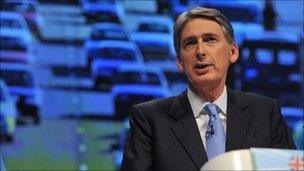Profile: Defence Secretary Philip Hammond
- Published

Mr Hammond has been an MP since 1997
Philip Hammond has built up a reputation as an articulate and effective Commons performer since being elected MP for Runnymede and Weybridge.
First elected in 1997, a bad year for the Conservatives, he was one of the first of that year's intake to be promoted to the health team within a year.
The long-serving frontbencher shadowed various departments in opposition, including Work and Pensions, health and trade and industry.
'War on motorist'
He might have expected to take on the number two job at the Treasury - having served as shadow chief secretary from July 2007 to May 2010. He had been in the role before, replacing George Osborne when he became shadow chancellor in 2005.
But the politics of entering coalition meant the job went to a Lib Dem - David Laws - while Mr Hammond found himself being made transport secretary, one of the briefs he had never shadowed.
And it would not be a comfortable ride for the new secretary of state - as he spearheaded plans for HS2 - the plan for a high speed railway - which proved unpopular with many of his own party's MPs as the route passes through Tory heartlands.
He pledged an end to what he called Labour's "war on the motorist" - scrapping the M4 bus lane introduced by his Labour predecessor John Prescott in 1999. Recently he has announced that the government planned to increase the speed limit on motorways in England and Wales to 80mph.
Bombardier row
But he provoked union anger when he awarded the £1.4bn contract to supply new trains for Thameslink to the German company Siemens, rather than British-based Bombardier, which went on to announce 1,400 job cuts in Derby.
The government said the Siemens bid represented the best value for money and EU procurement rules did not allow it to take into account where companies were based.
Born in 1955, the son of a retired engineer and local government officer, Mr Hammond went to Shenfield High School in Brentwood, Essex.
He won an open scholarship to Oxford University and rose quickly in business, setting up a company distributing medical equipment when he was 28.
He later became a consultant and then became the co-founder and director of property development company Castlemead.
He is believed to be one of the wealthiest men in the Cabinet. Last year the Daily Mail put him at number two, with reported assets of £7.5m, external.
Married with three children, he has a history of backing losers in party leadership races - he initially supported Peter Lilley for the leadership in 1997, switching to William Hague when he got eliminated. In 2001 he supported Michael Portillo's bid and in 2005 he backed David Davis. It has not stopped him from rising steadily through the party's ranks.
- Published14 October 2011